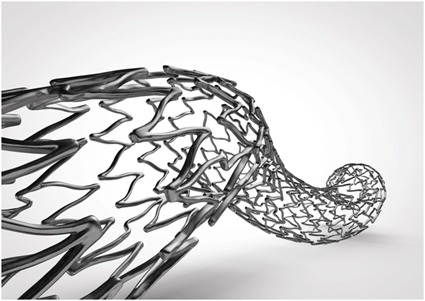
Thomas Zeller (Bad Krozingen, Germany) presented the 12-month results from Veryan Medical’s MIMICS-2, a prospective, single arm, multicentre clinical study to evaluate the safety and effectiveness of the BioMimics 3D helical, swirling flow stent system in the treatment of patients with symptomatic atherosclerotic disease of the femoropopliteal artery.
Zeller, who along with along with Timothy Sullivan (Minneapolis, USA) and Masato Nakamura (Tokyo, Japan) is a co-principal investigator, presented the MIMICS-2 12-month safety and efficacy data at LINC 2018 in Leipzig, Germany. He announced for the first time that both the primary safety and effectiveness endpoints were met; there were no stent fractures; the Kaplan-Meier estimate of freedom from loss of primary patency at 12 months was 81.9% at day 365 and the Kaplan-Meier estimate of freedom from clinically-driven target lesion revascularisation (CD-TLR) at 12 months was 88.8%.
He commented further that these MIMICS-2 results reinforce the results of the company’s earlier MIMICS-RCT study in a larger, more challenging patient population. The BioMimics 3D primary patency result at 12 months is similar to those reported for drug-eluting stents and drug-coated balloons which suggests that natural swirling flow is an alternative to antiproliferative drugs, a press release from the company states.
Conducted under a US FDA investigational device exemption with concurrence of the Japanese Pharmaceuticals and Medical Devices Agency (PMDA) under the FDA/PMDA Harmonisation By Doing collaboration, MIMICS-2 enrolled 271 patients undergoing femoropopliteal intervention across 43 investigational sites in US, Japan and Germany.
The BioMimics 3D stent has a three-dimensional helical shape, designed to impart natural curvature to the diseased femoropopliteal artery, promoting swirling flow and elevating wall shear, which has a protective effect on the endothelium. The helical shape of the BioMimics 3D stent is also designed to facilitate shortening of the stented segment during knee flexion and mitigate the risk of stented segment compression causing localised strains that in a straight stent may lead to stent fracture and chronic vascular injury, the release adds.
Chas Taylor, Veryan’s CEO commented: “The achievement of a successful outcome to our pivotal study, which has provided data for our premarket approval applications in the US and Japan, is a major milestone for Veryan as we build toward global commercialisation of our BioMimics 3D swirling flow stent. We would like to thank the principal investigators of MIMICS-2; and all the investigators and research teams that participated in the study. We are delighted that the MIMICS-2 results reinforce those from our earlier MIMICS randomised clinical trial. The combined results from these studies and other ongoing investigations support our belief that BioMimics 3D offers an important solution for both primary and complementary stenting in the femoropopliteal artery.”








